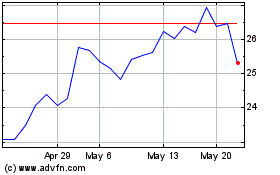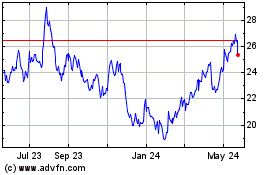By Jing Yang and Trefor Moss
One of China's largest car makers, Zhejiang Geely Holding Group
Co., is making plans to tap into the surging market for SPACs.
The multinational company, which owns Geely Automobile Holdings
Ltd., Volvo Car Group and several other electric-vehicle brands, is
in talks to sponsor a special-purpose acquisition company that
could raise $300 million in a Nasdaq initial public offering,
according to people familiar with the matter.
In addition, the Hangzhou-based group is considering taking one
of its European electric-vehicle subsidiaries public by merging it
with another SPAC and boosting its valuation sharply, to as much as
$40 billion, the people said.
SPACs, also known as blank-check companies, raise money by
selling stock publicly and listing on exchanges before finding
private businesses to merge with. They have surged in popularity
and drawn record sums of money from global investors, Many startups
also see mergers with SPACs as a faster and easier way to go
public.
More of Asia's tycoons and investment firms have capitalized on
the boom in SPACs on U.S. exchanges this year.
Geely, which is controlled by its billionaire chairman and
founder Li Shufu, is considering doing the same. The group is
discussing creating a SPAC with its Hong Kong-based venture arm,
GLY Capital Management, according to people familiar with the
matter. Under the plan being discussed, Mr. Li would sit on the new
company's board with two other Geely representatives and one from
Volvo, a person familiar with the talks said.
The funds raised by the new company could give Geely a war chest
as it ramps up investments in new technology such as
electrification and artificial intelligence. The plan is under
deliberation internally and may not go ahead, people familiar with
the matter said. GLY Capital, meanwhile, is raising a new venture
fund that will invest in "companies that seek to redefine the
transportation industry," the firm said last month. Geely and South
Korea's SK Holdings are anchor investors in the fund, which is
targeting a year-end close of $300 million.
Separately, Polestar, a Swedish electric-vehicle maker owned by
Volvo Cars and Geely, is considering going public in the U.S.
through a different SPAC in a transaction that could value the
business at as much as $40 billion, the people familiar with the
matter said. If achieved, it would be one of the most valuable SPAC
mergers.
Polestar has been a stand-alone brand since 2017 and focuses on
high-performance electric cars. The company is wrapping up a Series
A fundraising round that will value it at $7 billion, the people
said.
Polestar, which runs its day-to-day management and governance
independent of Geely and Volvo, is aiming for a Series B
fundraising that could boost its valuation to $20 billion by the
end of June, before merging with a SPAC to go public, the people
said.
Geely and Polestar are discussing the pros and cons of Polestar
going public through a SPAC, and a final decision hasn't been made,
people familiar with the matter said.
Geely has begun overhauling its strategy in recognition that it
has fallen behind in the transition to electric vehicles, now
widely viewed as a critical shift for all global auto makers. Its
various electric brands have sold poorly in China, while Tesla
Inc., BYD Co. and others have taken a commanding lead in the
segment. Last month, Geely said it would set up a China-based
company called Zeekr Co. to serve the premium electric-vehicle
space in which Polestar and Volvo operate.
Meanwhile, the values of U.S.-listed Chinese electric-vehicle
companies Li Auto Inc., Nio Inc. and XPeng Inc. have skyrocketed in
recent months, giving them valuations far in excess of Geely's.
Combining with a SPAC can be a fast track to a high valuation.
In February, Lucid Motors Inc., a fledgling electric-vehicle maker
based in Newark, Calif., agreed to merge with a SPAC in a deal that
valued Lucid at $24 billion.
Grab Holdings Inc., a Southeast Asian ride-sharing and delivery
company, is in talks to go public through a SPAC that could value
it as much as $40 billion, The Wall Street Journal reported.
Polestar vehicles are built in China, and the country's
electric-vehicle market is among the world's biggest. An October
recall of all global Polestar vehicles over faulty components that
caused some vehicles to lose power, however, has dented the brand's
reputation.
Despite positive reviews, the company's main production model,
the Polestar 2--which was positioned as a direct competitor to
Tesla's Model 3--has been a commercial flop in China.
It is now priced at the equivalent of about $41,000 before
subsidies, and around 400 units have sold since August, according
to the website D1EV, which tracks Chinese electric-vehicle sales.
Tesla, in contrast, sold 69,280 Shanghai-built Model 3 and Model Y
cars in the March quarter alone in China. The Model 3 sells for
around $38,000 in the country.
The Polestar 2 has had a better reception in Europe, where it
has sold more than 8,700 units since launching in July, according
to the website Car Sales Base. Its sales there are still dwarfed by
Tesla's Model 3 sedan, which sold more than 46,000 units in Europe
during the same period. U.S. deliveries of the Polestar 2, priced
locally at $59,900, began in December.
Raffaele Huang contributed to this article.
Write to Jing Yang at Jing.Yang@wsj.com and Trefor Moss at
Trefor.Moss@wsj.com
(END) Dow Jones Newswires
April 13, 2021 05:40 ET (09:40 GMT)
Copyright (c) 2021 Dow Jones & Company, Inc.
Geely Automobile (PK) (USOTC:GELYY)
Historical Stock Chart
From Dec 2024 to Jan 2025

Geely Automobile (PK) (USOTC:GELYY)
Historical Stock Chart
From Jan 2024 to Jan 2025
